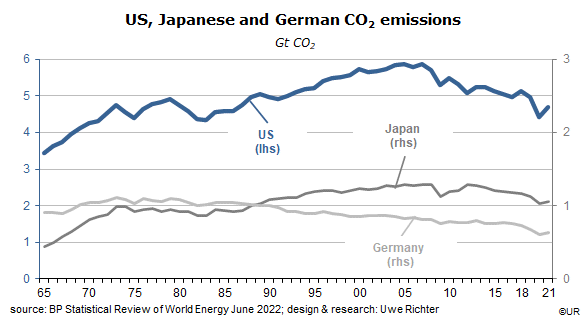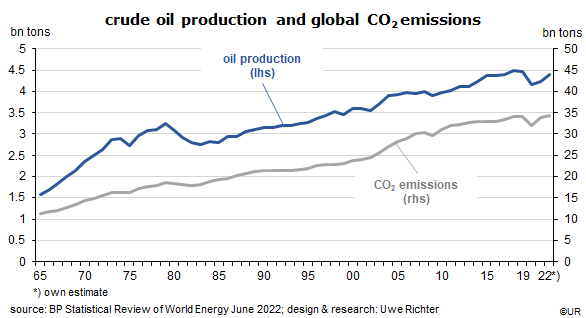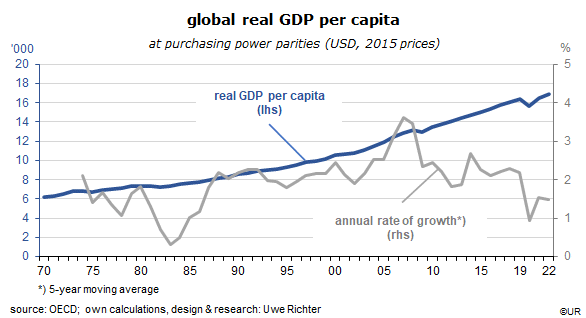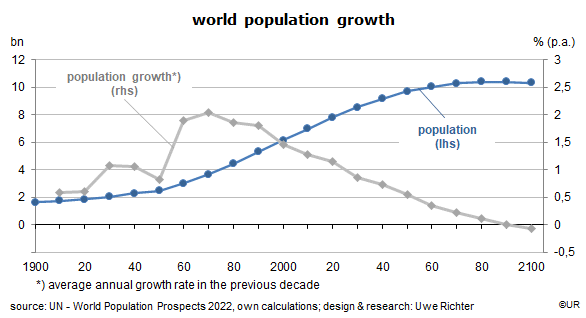
Market Commentary: The end of capitalism
Dieter Wermuth, Economist and Partner at Wermuth Asset Management
Fifty years ago, four MIT scientists had published a book called “Limits to Growth” where they made the point that the earth’s resources were depleted in an unresponsible way. The physical limits of this behavior were approached rapidly, and a catastrophe became unavoidable unless countries succeeded in reducing mankind’s ecological footprint, ie, to conserve the world’s resources. The book has been an international bestseller, with many new editions and revisions. It has sharpened people’s sense of ecological risks and has contributed to the success of green parties and policies.
In the years since, several books on the same topic have been published. A recent one has been by Ulrike Herrmann, a business journalist at TAZ, a German daily (“Das Ende des Kapitalismus”). It is well-written, with hundreds of footnotes, a comprehensive list of relevant literature and thus a serious piece of work. The main message is not that capitalism is about to end but that we should give up our wasteful lifestyle. If this would be done the right way, we would all be better off, not worse. Expropriations are not a solution – the price mechanism and private property have to be preserved. The book’s title is therefore not entirely correct and has obviously been chosen from a marketing point of view. Herrmann’s previous books have all been bestsellers in Germany.
Why should capitalism be near its end? She claims that capitalism needs economic growth, and growth in turn requires the unchecked exploitation of the earth’s limited resources. Since this cannot go on forever, the state needs to interfere to implement the energy transition and to allocate those resources to achieve the desired results. Her role model is the extraordinarily successful British wartime policy of 1940 to 1945. Within a very short period of time and under the guidance of the state, the peacetime economy was transformed into an economy that produced the goods and services needed for the military. There had been a strong consensus that private consumption and investment had to take backseats for as long as needed to win the war. Great Britain was the only large European country that was never occupied by Germany.
For me, such a strategy is clearly over the top given today’s environmental and resource challenges. Politically it would be a non-starter because Germans lacks the sense of urgency that existed in Britain at the beginning of Hitler’s war. I also doubt that economic growth is only possible by ever rising inputs of natural resources: in major OECD economies the burning of crude oil has been on a downward trend for years already, in spite of positive growth rates of real GDP. The trend of oil consumption is down, that of GDP is up, if at slower rates than in previous decades.

This reflects the changing structure of demand – services rather than goods – as well as increased relative prices of fossil energy, in combination with ambitious programs of European and North American governments to reduce CO2 emissions. Growth can be generated by rising labor input, for instance as a result of higher participation rates (of women or older people), or by productivity gains, not least by a more efficient use of resources. For this, a wartime approach of the government is not necessary – from a certain point onwards, growth does not need additional inputs of natural resources.
For the world as a whole, the demand for fossil fuels (and thus the destruction of the environment) continues to increase, though, as people in emerging economies keep buying autos, air conditioners and washing machines, catching up to the living standards in OECD countries.

The most effective tool for stopping the depletion of the world’s resources is to raise the standard of living in emerging markets where 85% of mankind lives. This process is under way. Those who criticise that this takes much too long should undertake additional efforts at home or export more capital to these regions.

If the general standard of living goes up, social systems typically become more robust, and people react by having fewer children – which also reduces the demand for natural resources. Some weeks ago it was reported that the world’s population has crossed the 8-billion mark. According to the United Nations, the annual growth rate is now just 0.9%, and is likely to fall further. At around 2070 or 2080, the population will reach a plateau of about 10 billion and then begin to decline. This is good news for the climate.

The main reason why some variant of a wartime economy for the benefit of the environment has only a very low probability to be implemented in democratically organized societies is the fact that capitalism, or market economies in general, has been a success story and will therefore not be given up easily.
In the Thanksgiving edition of his blog “just think”, Marco Annunziata has listed five reasons why we should be grateful for the good things the present system has delivered, in spite of all its problems and crises: 1. in 1990, close to 40% of the world population was struggling to survive on less than $2.15 a day; now it is just over 8%. 2. in 1998, 27% of the world population had no access to electricity; today it’s less than 10%; progress with regard to clean water is also dramatic, if somewhat slower. 3. infant mortality has been more than halved in the past 30 years, from about 65 deaths per 1,000 live births to 27. 4. compared to 1976, global literacy rates of women have increased from 58% to 83%, those of men from 75% to 90%. 5. improbable as it seems, global income inequality has been reduced significantly over the past 30 years, mostly for the benefit of the poorest and the middle income groups.
In spite of my criticisms, Ulrike Herrmann’s book is thought-provoking and informative. I would recommend it, for instance, for senior high school students – it contains many useful facts and insights that can be a good basis for discussions. They must be able to read German, though.
###
For more information please contact:
Instinctif Partners
Lars Hofer
E lars.hofer@instinctif.com
T +49 162 562 8917
Visit us: https://wermutham.com/
Follow us on Twitter and LinkedIn
About Wermuth Asset Management
Wermuth Asset Management (WAM) is a Family Office which also acts as a BAFIN-regulated investment consultant.
The company specializes in climate impact investments across all asset classes, with a focus on EU “exponential organizations” as defined by Singularity University, i.e., companies which solve a major problem of humanity profitably and can grow exponentially. Through private equity, listed assets, infrastructure and real assets, the company invests through its own funds and third-party funds. WAM adheres to the UN Principles of Responsible Investing (UNPRI) and UN Compact and is a member of the Institutional Investor Group on Climate Change (IIGCC), the Global Impact Investing Network (GIIN) and the Divest-Invest Movement.
Jochen Wermuth founded WAM in 1999. He is a German climate impact investor who served on the steering committee of “Europeans for Divest Invest”. As of June 2017, he was also a member of the investment strategy committee for the EUR 24 billion German Sovereign Wealth Fund (KENFO).
Legal Disclaimer
The information contained in this document is for informational purposes only and does not constitute investment advice. The opinions and valuations contained in this document are subject to change and reflect the viewpoint of Wermuth Asset Management in the current economic environment. No liability is assumed for the accuracy and completeness of the information. Past performance is not a reliable indication of current or future developments. The financial instruments mentioned are for illustrative purposes only and should not be construed as a direct offer or investment recommendation or advice. The securities listed have been selected from the universe of securities covered by the portfolio managers to assist the reader in better understanding the issues presented and do not necessarily form part of any portfolio or constitute recommendations by the portfolio managers. There is no guarantee that forecasts will occur.
Read the full article in PDF format here: English.